Intro
Discover essential pregnancy foods to eat, including nutrient-rich fruits, lean proteins, and whole grains, to support fetal development and a healthy pregnancy, with key nutrients like folic acid, iron, and calcium.
Pregnancy is a critical period in a woman's life, and a healthy diet is essential to support the growth and development of the fetus. Eating the right foods during pregnancy can help prevent complications, ensure a healthy birth weight, and support the overall well-being of both the mother and the baby. A well-balanced diet that includes a variety of nutrient-dense foods can provide the necessary building blocks for the fetus's growth and development. In this article, we will explore the best pregnancy foods to eat, their benefits, and how they can support a healthy pregnancy.
A healthy pregnancy diet should include a variety of foods from all food groups, including fruits, vegetables, whole grains, lean proteins, and healthy fats. These foods provide essential nutrients like folic acid, iron, calcium, and protein, which are crucial for the fetus's growth and development. Additionally, a healthy diet can help manage pregnancy symptoms like morning sickness, fatigue, and constipation. By making informed food choices, pregnant women can take control of their health and support the well-being of their baby.
Pregnancy is a time of significant physical and emotional changes, and a healthy diet can help alleviate some of the discomforts associated with pregnancy. For example, eating foods rich in omega-3 fatty acids, like salmon and walnuts, can help reduce inflammation and promote fetal brain development. Similarly, consuming foods high in fiber, like whole grains and legumes, can help prevent constipation and support healthy blood sugar levels. By incorporating these foods into their diet, pregnant women can promote a healthy pregnancy and reduce the risk of complications.
Essential Nutrients for Pregnancy
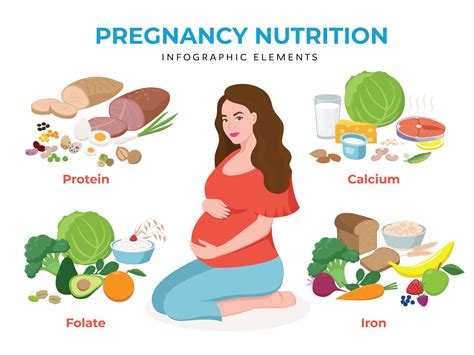
During pregnancy, the body requires more nutrients to support the growth and development of the fetus. Some essential nutrients for pregnancy include folic acid, iron, calcium, and protein. Folic acid is crucial for preventing birth defects of the brain and spine, while iron helps support the production of red blood cells. Calcium is essential for the development of the fetus's bones, teeth, and muscles, and protein supports the growth and development of the fetus's tissues. Pregnant women should aim to consume a variety of foods rich in these nutrients to ensure they are getting enough.
Foods Rich in Folic Acid
Folic acid is a crucial nutrient during pregnancy, and foods rich in folic acid include dark leafy greens, legumes, and citrus fruits. Some examples of folic acid-rich foods include: * Spinach * Broccoli * Avocados * Beans * Lentils * Oranges * GrapefruitsPregnancy Superfoods
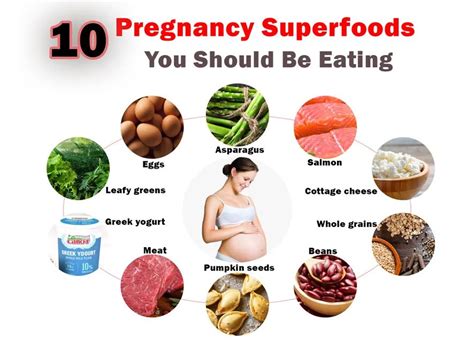
Pregnancy superfoods are nutrient-dense foods that provide a range of essential vitamins, minerals, and antioxidants. Some examples of pregnancy superfoods include:
- Salmon: rich in omega-3 fatty acids, which support fetal brain development and reduce inflammation
- Sweet potatoes: rich in vitamin A, which supports the development of the fetus's eyes, skin, and immune system
- Berries: rich in antioxidants, which help protect the fetus from oxidative stress and promote healthy growth and development
- Nuts and seeds: rich in healthy fats, protein, and fiber, which support the growth and development of the fetus's tissues
Benefits of Pregnancy Superfoods
Pregnancy superfoods offer a range of benefits for pregnant women, including: * Reduced risk of pregnancy complications * Improved fetal growth and development * Reduced risk of birth defects * Improved maternal health and well-being * Reduced risk of gestational diabetes and hypertensionFoods to Avoid During Pregnancy
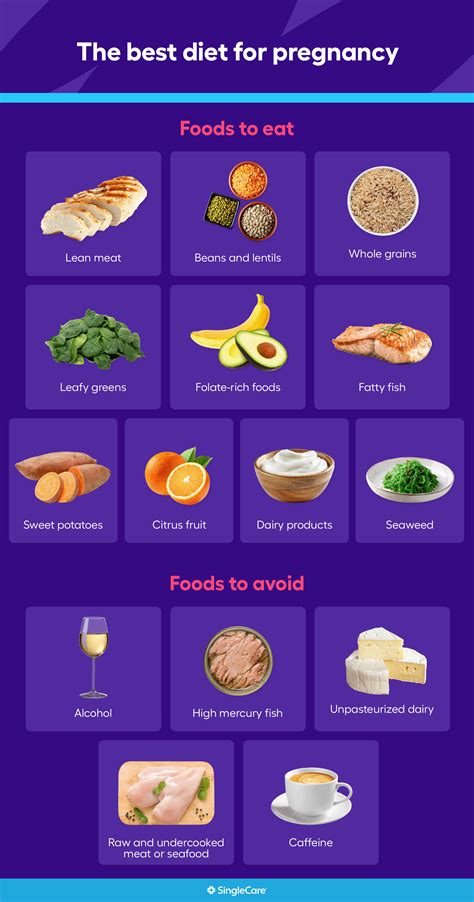
While a healthy diet is essential during pregnancy, there are some foods that pregnant women should avoid. These foods include:
- High-mercury fish: like shark, swordfish, and king mackerel, which can harm fetal brain development
- Unpasteurized dairy products: which can contain listeria and other bacteria that can harm the fetus
- Raw or undercooked meat: which can contain bacteria like salmonella and E. coli that can harm the fetus
- Excessive caffeine: which can increase the risk of miscarriage and growth restriction
Safe Food Handling During Pregnancy
Pregnant women should take extra precautions when handling food to reduce the risk of foodborne illness. Some safe food handling tips include: * Washing hands frequently with soap and water * Cooking food to the recommended internal temperature * Avoiding cross-contamination of foods * Storing food at the correct temperaturePregnancy Meal Planning
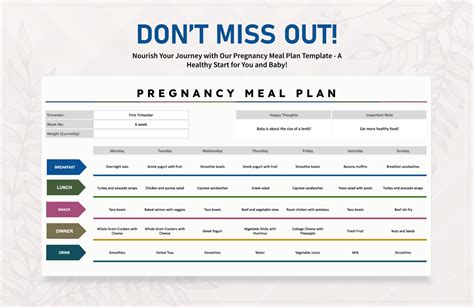
Pregnancy meal planning can help pregnant women ensure they are getting the nutrients they need to support a healthy pregnancy. Some tips for pregnancy meal planning include:
- Eating a variety of foods from all food groups
- Including a source of protein at each meal
- Choosing whole grains over refined grains
- Drinking plenty of water throughout the day
- Limiting sugary drinks and snacks
Sample Pregnancy Meal Plan
Here is a sample pregnancy meal plan that includes a variety of nutrient-dense foods: * Breakfast: oatmeal with fruit and nuts, scrambled eggs with whole grain toast * Lunch: grilled chicken breast with roasted vegetables and quinoa, whole grain pita with hummus and avocado * Snack: apple slices with almond butter, Greek yogurt with berries * Dinner: baked salmon with sweet potato and green beans, lentil soup with whole grain breadPregnancy Nutrition and Lifestyle
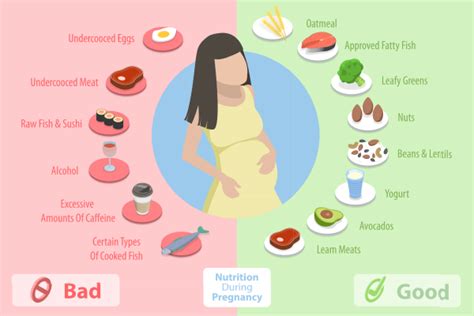
Pregnancy nutrition and lifestyle are closely linked, and making healthy lifestyle choices can support a healthy pregnancy. Some healthy lifestyle choices include:
- Getting regular prenatal care
- Engaging in regular physical activity, like walking or prenatal yoga
- Practicing stress-reducing techniques, like meditation or deep breathing
- Getting enough sleep each night
- Avoiding smoking and secondhand smoke
Importance of Prenatal Care
Prenatal care is essential for monitoring the health and well-being of both the mother and the baby. Regular prenatal care can help: * Identify potential complications early on * Monitor fetal growth and development * Provide guidance on healthy pregnancy habits * Support the physical and emotional health of the motherPregnancy and Mental Health

Pregnancy and mental health are closely linked, and pregnant women are at a higher risk of developing mental health conditions like depression and anxiety. Some factors that can contribute to mental health concerns during pregnancy include:
- Hormonal changes
- Sleep deprivation
- Physical discomfort
- Relationship stress
- History of mental health conditions
Supporting Mental Health During Pregnancy
There are several ways to support mental health during pregnancy, including: * Practicing stress-reducing techniques, like meditation or deep breathing * Engaging in regular physical activity, like walking or prenatal yoga * Connecting with friends and family for emotional support * Seeking professional help if symptoms persist or worsenConclusion and Next Steps
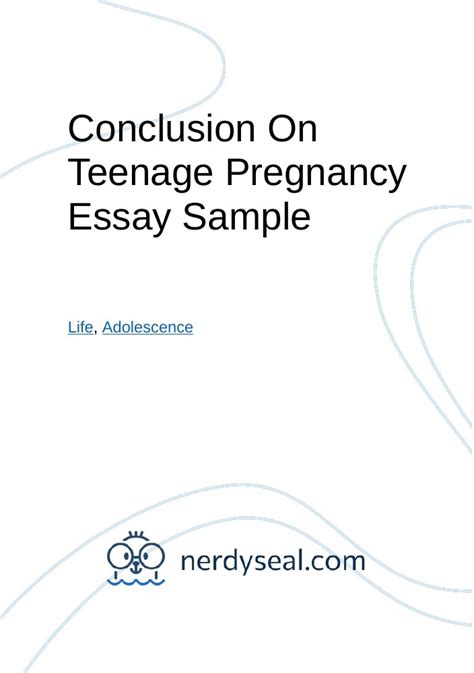
In conclusion, a healthy diet and lifestyle are essential for supporting a healthy pregnancy. By incorporating nutrient-dense foods, staying hydrated, and engaging in regular physical activity, pregnant women can promote a healthy pregnancy and reduce the risk of complications. Additionally, seeking regular prenatal care and supporting mental health can help ensure a positive pregnancy experience. If you have any questions or concerns about pregnancy nutrition or lifestyle, be sure to speak with your healthcare provider.
We invite you to share your thoughts and experiences with pregnancy nutrition and lifestyle in the comments below. What healthy habits have you incorporated into your pregnancy routine? What challenges have you faced, and how have you overcome them? By sharing your story, you can help support and inspire other pregnant women to prioritize their health and well-being.
What are the most important nutrients for pregnancy?
+Folic acid, iron, calcium, and protein are essential nutrients for pregnancy. These nutrients support the growth and development of the fetus, as well as the health and well-being of the mother.
How can I ensure I'm getting enough nutrients during pregnancy?
+Eating a variety of nutrient-dense foods, including fruits, vegetables, whole grains, lean proteins, and healthy fats, can help ensure you're getting enough nutrients during pregnancy. Additionally, considering prenatal supplements and seeking guidance from a healthcare provider can help support a healthy pregnancy.
What are some healthy snack options for pregnant women?
+Healthy snack options for pregnant women include fruits, nuts, seeds, whole grain crackers with avocado or hummus, and Greek yogurt with berries. These snacks provide essential nutrients and can help manage hunger and cravings.
